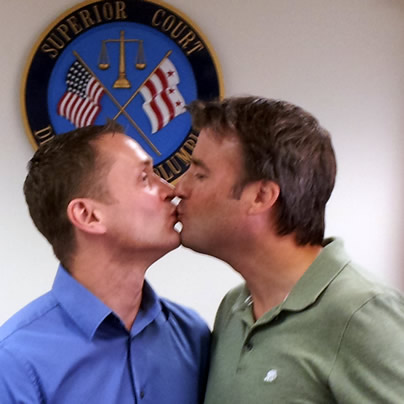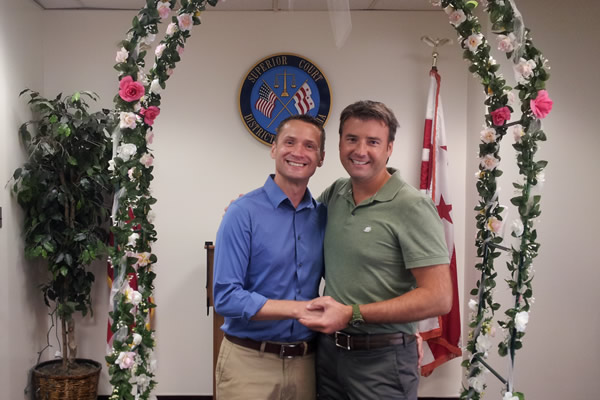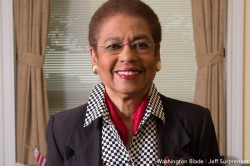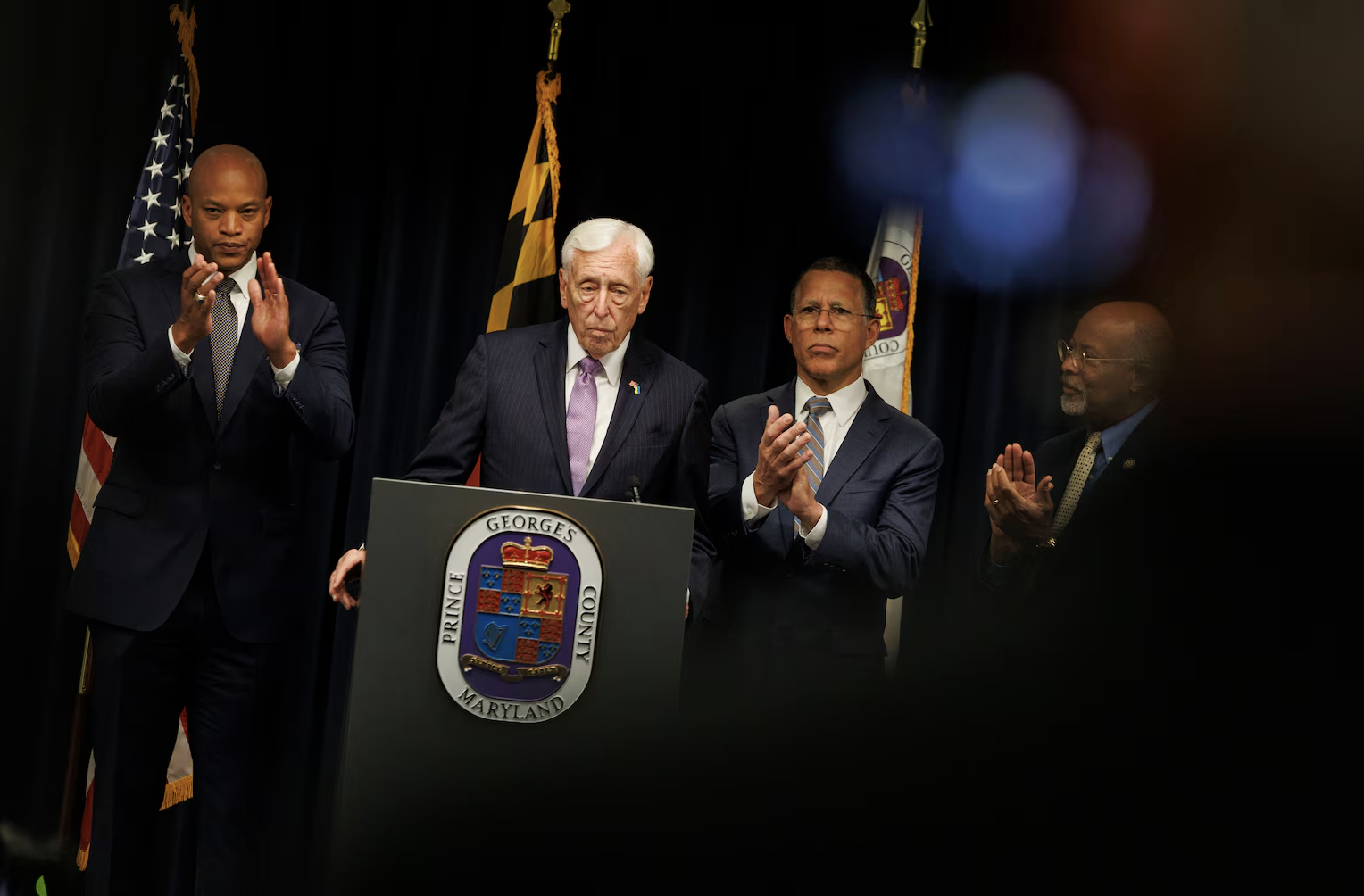Local
Long lines, frayed tempers for couples seeking to wed
D.C. courthouse staff overwhelmed as DOMA ruling triggers boom in marriage applications


David Kero-Mentz and his new husband Ken Kero-Mentz waited two hours for their marriage license to be processed in July. Despite the delay, the couple praised D.C. courthouse staff on the rush of gay marriage license applications following the death of DOMA. (Photo courtesy of the couple)
The number of people applying for a marriage license in D.C. each month has nearly tripled since the Supreme Court issued its landmark ruling on June 26 overturning the Defense of Marriage Act’s provision barring the federal government from recognizing same-sex marriages.
The D.C. Superior Court’s Marriage Bureau doesn’t keep track of the gender or sexual orientation of the couples applying for a marriage license. But court observers say gay and lesbian couples make up the overwhelming majority of the additional couples going to the Marriage Bureau on most days at the courthouse at 500 Indiana Ave., N.W.
“We were sitting there and there were so many same-sex couples,” said veteran lesbian activist and businesswoman Eva Freund in describing the scene in the waiting room at the Marriage Bureau last week as she and her partner of 21 years, Elke Martin, waited to be called to file their application for a marriage license.
The two women, who live in Vienna, Va., are among the large number of same-sex couples from states that don’t recognize gay marriage that are now getting married in D.C., which doesn’t have a residency requirement for obtaining a marriage license.
“We just kind of overwhelmed the place,” Freund told the Blade. “And then they called a name and it was a heterosexual couple. And Elke and I looked at one another and said, ‘What are they doing here?’ And then we said, ‘Oh yeah, they need papers, too.”
According to courthouse observers, Freund’s humorous anecdote may be the exception to the disposition of many of the couples – both gay and straight – who become irritable after waiting two hours or longer while the Marriage Bureau staff struggles to process the seeming explosion of applications since late June.
Ken Kero-Mentz, a U.S. Foreign Service officer, and his new husband, David Kero-Mentz, a German national, described their experience with the D.C. Superior Court’s Marriage Bureau as favorable, even though the two waited close to two hours in early July to have their license application processed. The couple also had to wait about eight weeks for an appointment to be married in a civil ceremony at the courthouse, a service the court began providing long before same-sex marriage became legal in D.C.
“Everyone was so nice to us,” said David Kero-Mentz, who is applying for U.S. permanent residency status now that the longstanding prohibition of immigration rights for gay bi-national couples ended with the Supreme Court ruling on DOMA.
Ken Kero-Mentz said he and David, while thrilled to be legally married, didn’t view their D.C. ceremony as that big a deal because they were joined as a couple in an official “registered life partner” ceremony in Berlin in 2008, with 95 friends and family members in attendance. Under German law, registered life partners have all the rights and benefits of a marriage, including immigration rights for foreign national partners.
The D.C. Superior Court has processed same-sex couple applications for marriage licenses since March of 2010, when the city’s marriage equality law took effect.
Court spokesperson Leah Gurowitz said that prior to the Supreme Court’s DOMA decision in late June, the court received on average between 300 and 400 license applications a month. But in July the number of couples applying for a license jumped to 977 and in August the number of couples applying totaled 908 – more than double the average, Gurowitz told the Blade.
“The D.C. Superior Court is committed to addressing the needs of those seeking our services as promptly as possible,” she said in a statement. “In order to meet the increased demand, additional staff have been detailed to the Marriage Bureau.”
Gurowitz added, “In addition, we are working to locate additional office space to help handle the number of applicants we are currently seeing each day, as well as evaluating work processes to improve our customer service.”
Gay rights attorneys have said they expected more same-sex couples to marry following the Supreme Court ruling, which cleared the way for married same-sex couples to obtain most if not all of the federal rights and benefits of marriage.
The Obama administration’s aggressive effort to quickly implement the DOMA ruling by directing federal agencies, including all the branches of the military, to provide marital benefits to same-sex spouses of federal workers, civilian and active duty military, has also boosted the number of lesbian and gay couples deciding to tie the knot, experts have said.
D.C. gay activist Christopher Dyer, who last year obtained a license to perform marriages as a court-approved officiant, said the number of same-sex couples seeking him out to perform their marriage has doubled since the Supreme Court decision.
“I’m getting more military people than ever before,” he said. “Many of them are from Virginia.”
Local gay rights attorney Michele Zavos, who practices family law in the D.C. metro area, said she and other attorneys familiar with the marriage laws of D.C. and Maryland are advising out-of-state clients to choose D.C. over Maryland as the preferred place to marry.
Although same-sex marriage became legal in Maryland earlier this year, Zavos points out that unlike D.C., Maryland has a residency requirement for couples seeking to get a divorce. This means that if a same-sex couple from Virginia or other states that don’t recognize gay marriage decide to marry in Maryland, they could not obtain a divorce in Maryland unless they become a Maryland resident for a year, Zavos said.
She noted that they couldn’t obtain a divorce in their home state if that state doesn’t recognize their marriage, especially if the state has a law or constitutional amendment specifically banning same-sex nuptials as Virginia does.
“Nobody wants to hear this, of course,” Zavos said. “They’re about to be married. They don’t want you to be talking to them about getting divorced.”
Nevertheless, Zavos said many same-sex couples knowledgeable about the residency rules for divorce are choosing D.C. and Delaware, which also allows out-of-state couples to file for a divorce without a residency requirement.
Among those encountering the brunt of the delays at the D.C. Superior Court’s Marriage Bureau are the private marriage officiants who, among other things, file marriage license applications at the courthouse for their same-sex couple clients.
Deborah Cummings-Thomas and her wife, lesbian activist Sheila Alexander-Reid, co-owners of Marry Me In D.C., Inc., specialize in marrying same-sex couples and taking care of the couples’ marriage-related paperwork.
“It’s a nightmare down there right now,” Cummings-Thomas said. “It often takes two hours, sometimes longer” to file a marriage license application, she said. “I’ve been there when people waiting have gotten very upset.” She said 95 percent of the couples she marries are from jurisdictions outside D.C. and at least 95 percent or more of her clients arrange for her to go to the courthouse to deal with the application.
“The employees are very nice,” said Rev. Starlene Joyner Burns, another D.C. marriage officiant who reaches out to same-sex couples. “But they realize the office needs more help. It’s not a system that is broken. It’s just that the demand is greater than what it was in the past.”

One marriage officiant criticized Del. Eleanor Holmes Norton, claiming she should be doing more to secure funds to hire staff at D.C.’s marriage bureau.(Washington Blade file photo by Jeff Surprenant)
Another marriage officiant, who spoke on condition of not being identified, criticized D.C. Congressional Del. Eleanor Holmes Norton for not pushing for more funds from Congress to hire additional staff at the courthouse to handle the greater demand for marriage licenses.
Congress and various federal agencies control the D.C. court system rather than the city government under the city’s limited home rule charter. Norton spokesperson Daniel Van Hoogstraten said he would look into the matter.
Others familiar with the Marriage Bureau noted that the D.C. City Council could help the situation by changing the wording in the city’s marriage law that requires a three-day waiting period between the time a marriage license application is submitted and the time a marriage can take place. Marriage laws in most other states have a similar waiting period but those states, like Maryland, issue the license during the applicants’ first visit to the state marriage bureau and post-date it to prevent the marriage from taking place until after the waiting period expires.
Critics of the D.C. Marriage Bureau say it requires applicants or officiants working on their behalf to return to the bureau a second time to pick up the license following the waiting period, a process that causes further delays.
But according to people familiar with the D.C. marriage law, the law prevents the Marriage Bureau from postdating a marriage license because it states explicitly that a license “shall not be issued until three days have elapsed” from the time the application is filed.
“They have two people handling 50 or 60 people at any given time,” said the marriage officiant who asked not to be identified. “They told me please do what you can to get out the word and help us get more staff.”
Virginia
Gay Va. State Sen. Ebbin resigns for role in Spanberger administration
Veteran lawmaker will step down in February

Alexandria Democrat Adam Ebbin, who has served as an openly gay member of the Virginia Legislature since 2004, announced on Jan. 7 that he is resigning from his seat in the State Senate to take a job in the administration of Gov.-Elect Abigail Spanberger.
Since 2012, Ebbin has been a member of the Virginia Senate for the 39th District representing parts of Alexandria, Arlington, and Fairfax counties. He served in the Virginia House of Delegates representing Alexandria from 2004 to 2012, becoming the state’s first out gay lawmaker.
His announcement says he submitted his resignation from his Senate position effective Feb. 18 to join the Spanberger administration as a senior adviser at the Virginia Cannabis Control Authority.
“I’m grateful to have the benefit of Senator Ebbin’s policy expertise continuing to serve the people of Virginia, and I look forward to working with him to prioritize public safety and public health,” Spanberger said in Ebbin’s announcement statement.
She was referring to the lead role Ebbin has played in the Virginia Legislature’s approval in 2020 of legislation decriminalizing marijuana and the subsequent approval in 2021of a bill legalizing recreational use and possession of marijuana for adults 21 years of age and older. But the Virginia Legislature has yet to pass legislation facilitating the retail sale of marijuana for recreational use and limits sales to purchases at licensed medical marijuana dispensaries.
“I share Governor-elect Spanberger’s goal that adults 21 and over who choose to use cannabis, and those who use it for medical treatment, have access to a well-tested, accurately labeled product, free from contamination,” Ebbin said in his statement. “2026 is the year we will move cannabis sales off the street corner and behind the age-verified counter,” he said.
Maryland
Steny Hoyer, the longest-serving House Democrat, to retire from Congress
Md. congressman served for years in party leadership

By ASSOCIATED PRESS and LISA MASCARO | Rep. Steny Hoyer of Maryland, the longest-serving Democrat in Congress and once a rival to become House speaker, will announce Thursday he is set to retire at the end of his term.
Hoyer, who served for years in party leadership and helped steer Democrats through some of their most significant legislative victories, is set to deliver a House floor speech about his decision, according to a person familiar with the situation and granted anonymity to discuss it.
“Tune in,” Hoyer said on social media. He confirmed his retirement plans in an interview with the Washington Post.
The rest of this article can be found on the Baltimore Banner’s website.
District of Columbia
Kennedy Center renaming triggers backlash
Artists who cancel shows threatened; calls for funding boycott grow

Efforts to rename the Kennedy Center to add President Trump’s name to the D.C. arts institution continue to spark backlash.
A new petition from Qommittee , a national network of drag artists and allies led by survivors of hate crimes, calls on Kennedy Center donors to suspend funding to the center until “artistic independence is restored, and to redirect support to banned or censored artists.”
“While Trump won’t back down, the donors who contribute nearly $100 million annually to the Kennedy Center can afford to take a stand,” the petition reads. “Money talks. When donors fund censorship, they don’t just harm one institution – they tell marginalized communities their stories don’t deserve to be told.”
The petition can be found here.
Meanwhile, a decision by several prominent musicians and jazz performers to cancel their shows at the recently renamed Trump-Kennedy Center in D.C. planned for Christmas Eve and New Year’s Eve has drawn the ire of the Center’s president, Richard Grenell.
Grenell, a gay supporter of President Donald Trump who served as U.S. ambassador to Germany during Trump’s first term as president, was named Kennedy Center president last year by its board of directors that had been appointed by Trump.
Last month the board voted to change the official name of the center from the John F. Kennedy Memorial Center For The Performing Arts to the Donald J. Trump And The John F. Kennedy Memorial Center For The Performing Arts. The revised name has been installed on the outside wall of the center’s building but is not official because any name change would require congressional action.
According to a report by the New York Times, Grenell informed jazz musician Chuck Redd, who cancelled a 2025 Christmas Eve concert that he has hosted at the Kennedy Center for nearly 20 years in response to the name change, that Grenell planned to arrange for the center to file a lawsuit against him for the cancellation.
“Your decision to withdraw at the last moment — explicitly in response to the Center’s recent renaming, which honors President Trump’s extraordinary efforts to save this national treasure — is classic intolerance and very costly to a non-profit arts institution,” the Times quoted Grenell as saying in a letter to Redd.
“This is your official notice that we will seek $1 million in damages from you for this political stunt,” the Times quoted Grenell’s letter as saying.
A spokesperson for the Trump-Kennedy Center did not immediately respond to an inquiry from the Washington Blade asking if the center still planned to file that lawsuit and whether it planned to file suits against some of the other musicians who recently cancelled their performances following the name change.
In a follow-up story published on Dec. 29, the New York Times reported that a prominent jazz ensemble and a New York dance company had canceled performances scheduled to take place on New Year’s Eve at the Kennedy Center.
The Times reported the jazz ensemble called The Cookers did not give a reason for the cancellation in a statement it released, but its drummer, Billy Hart, told the Times the center’s name change “evidently” played a role in the decision to cancel the performance.
Grenell released a statement on Dec. 29 calling these and other performers who cancelled their shows “far left political activists” who he said had been booked by the Kennedy Center’s previous leadership.
“Boycotting the arts to show you support the arts is a form of derangement syndrome,” the Times quoted him as saying in his statement.
-

 Sponsored4 days ago
Sponsored4 days agoSafer Ways to Pay for Online Performances and Queer Events
-

 District of Columbia3 days ago
District of Columbia3 days agoTwo pioneering gay journalists to speak at Thursday event
-

 Colombia3 days ago
Colombia3 days agoBlade travels to Colombia after U.S. forces seize Maduro in Venezuela
-

 a&e features3 days ago
a&e features3 days agoQueer highlights of the 2026 Critics Choice Awards: Aunt Gladys, that ‘Heated Rivalry’ shoutout and more




















